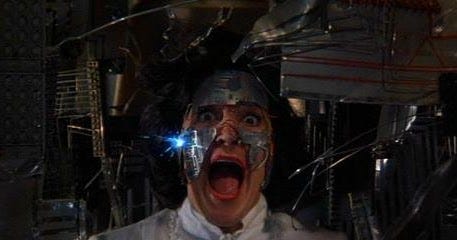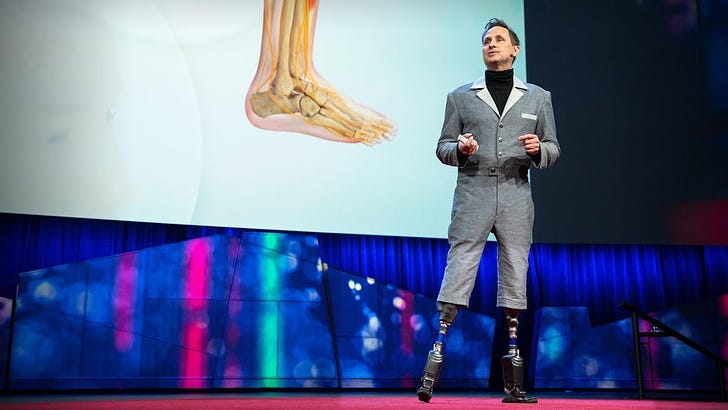#28: Invasion of the Body Hackers
"I've come to help you with your problems, so we can be free?"
Sitting on my living room floor, munching on sugary cereal, I would often watch cartoons in the early morning. It only occurs to me now, reflecting back on those times, that a lot of what I watched were shows that were fascinated with robots.
Most of the time, these were fun. I loved Astroboy. I also remember the PSA that would air during commerical breaks about a little robot playing in an industrial wasteland.

But these were already robots. One afternoon, I saw a movie that scared the hell out of me. Was it the gore of a slasher flick? Or the twists and turns following the mind of a psychopath? No, it was the body horror that is Superman III.
Now, you may be thinking, “Yes, it’s a brutal assassination of a story and characters established in the original classic by Christopher Reeve and Gene Hackman. But ‘scared’ or ‘body horror’ seems a bit much.” But it’s not the whole movie. It’s one scene in particular.
THAT scene.1

Even at 40, it still gives me the creeps.
Something More Than a Machine
What is a cybernetic organism? Some dictionaries simply consider a cyborg as a creature of our imagination, “part human and part machine”. Other definitions are expanded by discussing what the machine provides the meat: “A living being whose powers are enhanced by computer implants or mechanical body parts.”
Within such broad definitions, many of us could possibly be considered to be cyborgs. How many of us have, or know someone who has an artificial limb, a cochlear implant, or an artificial heart valve? One might imagine something more futuristic than a pacemaker in their vision of half-human, half-robot - maybe more along the lines of the exoskeletons in development that allow previously-paralyzed people full motion again.
Science is so cool.
Paranoid Android?
The examples above are alterations that were conceived and designed with certain utilitarian (rather than aesthetic) goals in mind - replacement of function, extension of life. But humans being curious have, inevitably, stretched beyond these outcomes. Before reading up for this post, I never knew about “body hackers” and “bio hackers”, but there exists a whole community that explores ways to improve quality of life and even the limits of our original senses and processes. For example, these hackers have self-modified their bodies by:
Implanting RFID chips under the skin in their hands, so they can enter rooms without needing a key for the lock, or a flick of a lightswitch.
Installing an antenna in their heads like a Snork, so they can now listen to colours.2
Growing an ear on an arm that can be linked to the WiFi, so people on the Internet can listen to the sounds in their local environment.3
Scarier still is the mentality that we don’t need proper scientific expertise or studies to verify the quality of possible modifications:
Rob Carlson, an expert on synthetic biology who’s been advocating for biohacking since the early 2000s, told me that to his mind, “all of modern medicine is hacking,” but that people often call certain folks “hackers” as a way of delegitimizing them. “It’s a way of categorizing the other — like, ‘Those biohackers over there do that weird thing.’ This is actually a bigger societal question: Who’s qualified to do anything? And why do you not permit some people to explore new things and talk about that in public spheres?”
Sigal Samuel, How biohackers are trying to upgrade their brains, their bodies — and human nature
While a proponent of patient-designed and -led projects - scientific and medical gatekeeping is a problem to acknowledging and including other forms of expertise, such as lived experience - it should also be balanced with rigour and sound methodology. Inclusive, decolonized science doesn’t mean shoddy science.
What bothers me, too, is that neither of the above definitions tell us how much of a person needs to be altered to be considered a cyborg - is it half and half? Or is having any one piece of your original construction swapped out enough to become Mr. Roboto?
Does it have to be six million dollars4, or is a couple hundred dollars enough for transhuman status?
Dr. Hugh Herr argues that a key milestone to becoming a cyborg is how the technology relates back to us. Despite the slick, advanced technology of his prosthetic legs, he cannot feel them as truly part of “him” (unlike Bucky Barnes and his Wakandan left arm). The neural connection that enmeshes machine with man is still missing, and until that is cracked, we won’t have the integration of the mechanical with how our brain sees and senses our bodies in the world. Until then, they are only tools attached to “what’s left”.
My psychology senses, of course, tingle when it comes to the “what’s left”. How does increasing bodily interfacing with machines change our humanity, and when is it too much? Is there even a “too much”? Just because we can, does it mean we should? I’d love to hear what you think in the comments. Perhaps, the increasing integration of man and machine is simply the natural evolution of an industrial society and a species that is always seeking frontiers to explore and conquer.
Unlike Astar, I can’t take my arm off - for now.
Thanks for reading today’s post, the second in my spooky science series. If you’re interested in reading more science-related content, please consider subscribing to receive weekly posts in your email or Substack app.
As well, check out The Sample. They curate articles from other blogs and newsletters, and send ones that match your interests.
I’m not alone in my fear. This scene scarred so many kids in the 80s.
Maybe weed is still criminalized where they live?
Did he steal from David Cronenburg, or vice versa?
If you understand this reference, you should likely start thinking about cybernetic body parts (present company included).





I think a childhood television scare haunts all of us! My brother is STILL (at 49!) gets freaked by the Six Million Dollar Man episode when the Russian space probe lands in Wyoming and tries to destroy a nearby town. Probably doesn't hurt that the title of the episode is called 'Deathprobe'! I, on the other hand, remember less about the episode than laying on the floor, staring up at the TV and eating jelly beans from the candy jar my parents had put out for Christmas. But, then, I was four years older ... and so much cooler.
Anyway now I’m going to hide in my bed. This sort of thing freaks me out too!